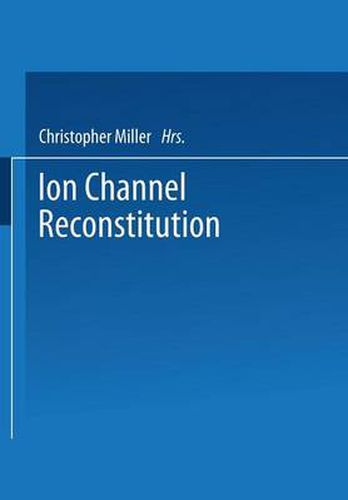Readings Newsletter
Become a Readings Member to make your shopping experience even easier.
Sign in or sign up for free!
You’re not far away from qualifying for FREE standard shipping within Australia
You’ve qualified for FREE standard shipping within Australia
The cart is loading…






This title is printed to order. This book may have been self-published. If so, we cannot guarantee the quality of the content. In the main most books will have gone through the editing process however some may not. We therefore suggest that you be aware of this before ordering this book. If in doubt check either the author or publisher’s details as we are unable to accept any returns unless they are faulty. Please contact us if you have any questions.
It is now over 30 years since the idea of ion-conducting pores burst on the elec- trophysiological scene, 15 years since these were generalIy realized to be mem- brane-spanning proteins, and 10 years since the first observations of single ion channels from higher organisms were made. During the past 5 years, several integral membrane channel proteins have been purified in a functionalIy competent state: the nicotinic acetylcholine receptor, the Na + channel, mitochondrial VDAC, and a variety of porins. The stage is thus set to attack ion channels in the same ways that biochemists have been attacking enzymes for decades: isolation folIowed by functional analysis in as simple a system as possible, with a view towards understanding the molecular mechanisms ofthe protein’s behavior and how this is related to the underlying molecular structure. This is always a daunting task, alI the more so with ion channels because of our still primitive and scanty understanding of channel structures and because of the difficulty in iso- lating functionally active channel proteins. In this volume, which can be considered a biochemically slanted companion to Sakmann and Neher’s Single-Channel Recording, I have tried to present a view of the current landscape of ion-channel reconstitution. These chapters illustrate not only the different approaches and techniques of the major practitioners of ion- channel reconstitution but, as importantly, the varied motivations for doing this kind of work.
$9.00 standard shipping within Australia
FREE standard shipping within Australia for orders over $100.00
Express & International shipping calculated at checkout
This title is printed to order. This book may have been self-published. If so, we cannot guarantee the quality of the content. In the main most books will have gone through the editing process however some may not. We therefore suggest that you be aware of this before ordering this book. If in doubt check either the author or publisher’s details as we are unable to accept any returns unless they are faulty. Please contact us if you have any questions.
It is now over 30 years since the idea of ion-conducting pores burst on the elec- trophysiological scene, 15 years since these were generalIy realized to be mem- brane-spanning proteins, and 10 years since the first observations of single ion channels from higher organisms were made. During the past 5 years, several integral membrane channel proteins have been purified in a functionalIy competent state: the nicotinic acetylcholine receptor, the Na + channel, mitochondrial VDAC, and a variety of porins. The stage is thus set to attack ion channels in the same ways that biochemists have been attacking enzymes for decades: isolation folIowed by functional analysis in as simple a system as possible, with a view towards understanding the molecular mechanisms ofthe protein’s behavior and how this is related to the underlying molecular structure. This is always a daunting task, alI the more so with ion channels because of our still primitive and scanty understanding of channel structures and because of the difficulty in iso- lating functionally active channel proteins. In this volume, which can be considered a biochemically slanted companion to Sakmann and Neher’s Single-Channel Recording, I have tried to present a view of the current landscape of ion-channel reconstitution. These chapters illustrate not only the different approaches and techniques of the major practitioners of ion- channel reconstitution but, as importantly, the varied motivations for doing this kind of work.